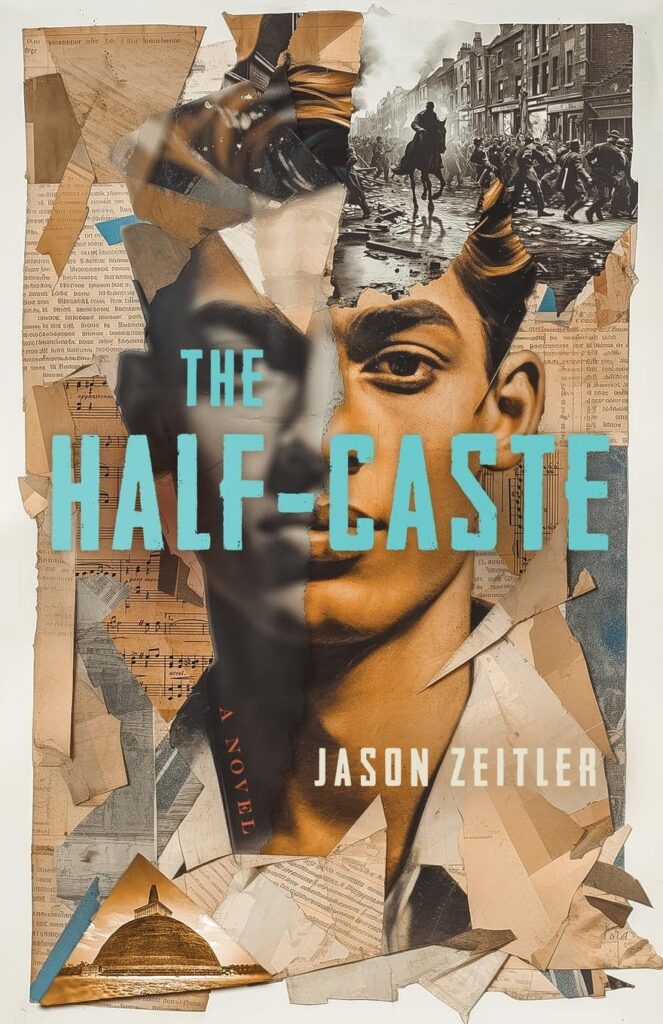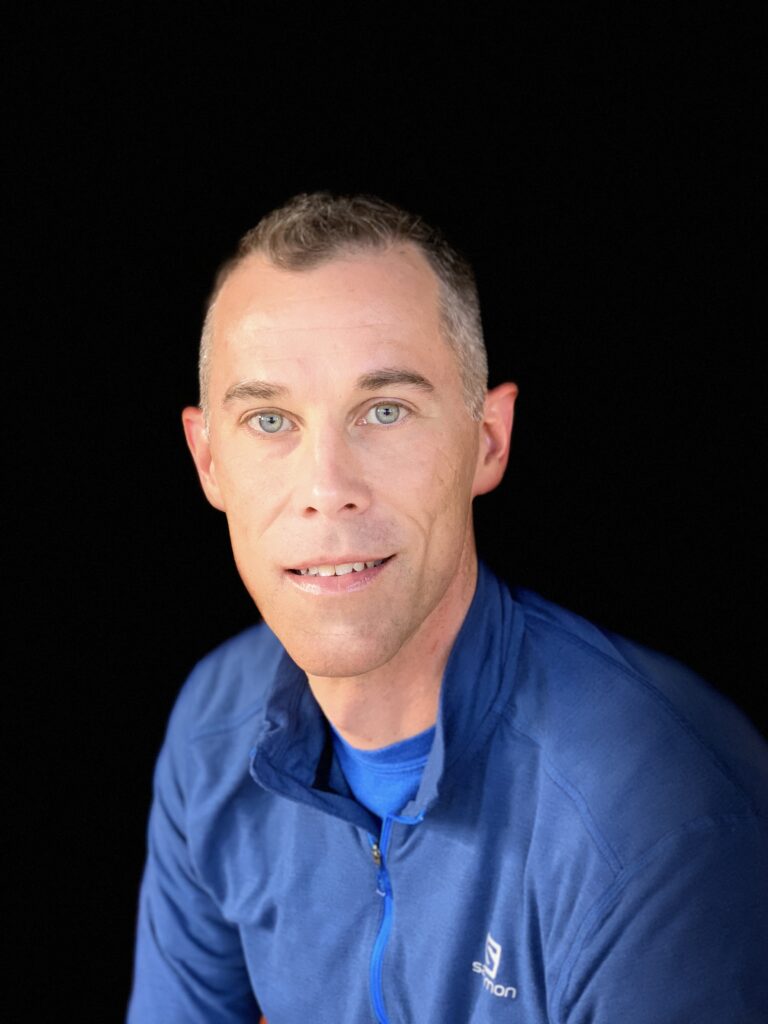Shelf Media hosts the annual Shelf Unbound Indie Best Book Competition for best self-published or independently published book. You can find the winner, finalists, long-listed, and more than 100 notable books from the competition in the December/January 2024 issue of Shelf Unbound.

About The Author: Jason Zeitler

Jason Zeitler is the author of the novella Like Flesh to the Scalpel (Running Wild Press, 2018), and his stories and essays have appeared in the Journal of Experimental Fiction, Midwestern Gothic, Two Thirds North, and elsewhere. He lives in Tucson with his wife and son. His debut novel The Half-Caste was shortlisted for the 2022 JEF Books competition. It also won a silver medal in the Best New Voice category of the 2024 IBPA Benjamin Franklin Awards.
Interview with Jason Zeitler
Could you give us a glimpse into the heart of your book?
JZ:The Half-Caste is about a lot of things, but it’s mainly about human progress. A point the book makes is that orchestral music is the pinnacle of human achievement because it exemplifies a sophisticated kind of pluralism: all these disparate voices working together to achieve a common end. Saul Maccabee, one of the book’s two main characters, says this very thing in the “Point” chapter. It’s for this reason that music features so prominently in the narrative. Essentially I viewed the book as a musical composition, and I chose to have two protagonists and to alternate perspectives between them because it was the closest I could get to approximating multi-voiced counterpoint. Consistent with this, the book’s ending emulates a musical coda. The Half-Caste has strong plotlines, but ultimately it’s a book of ideas, so it made sense for the ideas to drive the narrative structure.
What sparked the initial idea for your story?
JZ: I’ve always been fascinated by the 1930s. When I was an undergraduate at the University of Virginia, I majored in English in what was then called the modern-studies program. I mostly read literature from the early twentieth century, with an emphasis on the inter-war years. After I graduated, I continued reading books from that era, including ones by Leonard and Virginia Woolf, and eventually I decided to write a novel of my own. I set it during the 1930s as a way of insinuating myself into the period, of creating my own version of that world and directly experiencing it through my characters. Leonard Woolf was the inspiration for the Saul character in The Half-Caste. One of my attractions to Woolf, besides his marriage to Virginia, was that he spent seven years in Ceylon as a British civil servant. As part of my research for The Half-Caste, I read his five-volume autobiography. In creating Saul Maccabee, however, I took considerable creative license, so he ended up looking very different from Woolf’s self-portrait. The inspiration for The Half-Caste’s other protagonist, Vernon Prins, was closer to home. My wife is Sri Lankan, and so our son is himself a “half-caste.” I created Vernon to get a better understanding of what my son might have gone through if he had lived during the politically turbulent 1930s.
How did writing this book impact you personally?
JZ: It took me over 6,000 hours to write, so I lived in the world of The Half-Caste for a long time. When you do that, when you immerse yourself in a fictional world of your own making for years at a time, it’s impossible not to identify with the characters you’ve created. In fact, you wish to become them. What I admire most about Vernon and Saul is their political activism and their almost pathological desire to do the right thing. It has caused me to want to follow in their footsteps.
Were there any unexpected insights or discoveries along the way?
JZ: A significant insight was that even humans who are diametrically opposed politically have more in common than not because of their shared humanity. As a result, The Half-Caste thoroughly explores the idea of empathy. Inherent in empathy is the recognition that experiences are subjective and that everyone has a different perspective. Throughout the novel, Vernon and Saul often have similar experiences, such as the death of a loved one, to which they respond in their own unique ways—and yet sometimes those responses differ only in degree. Two sections in the “Rebirth” chapter actually render the same action from both protagonists’ perspectives to illustrate through narrative how and why perspectives can differ.
Another thing I spent time researching for The Half-Caste was political theories that were prevalent during the late 1800s and early 1900s. I discovered, for example, that progressive Victorians believed that human evolution could become a conscious process. Such thinking underpinned certain policies the British Liberal and Labour Parties pursued around the turn of the century. It occurred to me as I wrote The Half-Caste that the Victorian notion about evolution has corollaries in Buddhism, the Sri Lankan majority religion. Because Vernon’s mother is Sinhalese, he would have learned about Buddhism growing up—which is why the religion features in The Half-Caste. What I realized in writing the Ceylon part of the book is that the Buddhist idea of rebirth could be considered a metaphor for human progress. To get this point across to the reader, I used Vernon as my mouthpiece and had him describe the metaphor in a letter to Zoe, his British girlfriend.
What lasting message or experience do you hope readers will carry with them?
JZ:Readers and reviewers alike have characterized The Half-Caste’s ending as satisfying. Part of the reason for this is that the ending is hopeful. The book doesn’t have a happy ending by any stretch of the imagination, but it does contain a message of hope. The reader walks away feeling satisfied because they know that Vernon and Saul will do the right thing, whatever obstacles the future holds for them. The book’s characters also convey a message of hope by taking the long view of human progress. In a flashback at the end of the book, Vernon’s sister Minnette tells Saul that the world is destined to improve, reframing a conversation in the “Interlude” chapter in which Vernon and Saul discuss taking the long view from an economic perspective. My hope is that readers will internalize this message but also remain vigilant. It’s no coincidence that in the novel Vernon takes to heart the maxim “Eternal vigilance is the price of liberty.”
Can you share a sneak peek of what you’re working on next?
JZ: My I’m currently working on a second novel. I finished The Half-Caste with a desire to delve more deeply into Buddhism. The new novel isn’t a sequel to The Half-Caste, but it’s definitely an offshoot. The working title for my latest novel is A New Birth, which takes place from 1932 to 1942 and which has three settings: Berlin, Germany; Dehra Dun, India; and various parts of Ceylon. To make the book’s weighty philosophical content more engaging and accessible to readers, I’m writing the narrative in first-person point of view from the perspective of a German who speaks in a dialect known as Berlin snout. You could say the book blends the seriousness of The Half-Caste with the dark comedy of my shorter fiction. In some ways the narrator of A New Birth is a return to the irreverent narrator of my novella Like Flesh to the Scalpel, which was recently republished as part of my story collection The Breatharian and Other Stories.

Continue Reading…
Article originally Published in the December/January 2024 Issue “2024 Indie Best Award Winners”
